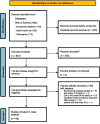A meta-analysis of the impact of technology related factors on students' academic performance
- PMID: 40070897
- PMCID: PMC11894741
- DOI: 10.3389/fpsyg.2025.1524645
A meta-analysis of the impact of technology related factors on students' academic performance
Abstract
Introduction: The relationship between students' smartphone addiction, social media use, video games play, and their academic performance has been widely studied, yet the existing literature presents inconsistent findings. This meta-analysis synthesizes current research to provide a comprehensive examination of the impact of these technologies on academic achievement.
Methods: A total of 63 studies (yielding 64 effect sizes) were included, encompassing a sample of 124,166 students from 28 countries. The meta-analysis utilized correlation coefficients and sample sizes, reporting results based on the random effects model. Key statistics such as the Fisher's Z value, confidence intervals, and heterogeneity (Q) test results were considered, and publication bias was assessed using Begg and Mazumdar's rank correlation test, with the Kendall Tau coefficient determining bias significance.
Results and discussion: The meta-analysis revealed a small but statistically significant negative association between smartphone use, social media use, video game playing, and students' academic performance [Q(64) = 2501.93, p < 0.001, d = -0.085]. It is concluded that increased use of these technologies was associated with poorer academic outcomes, potentially impacting key cognitive skills essential for academic success. The implications for educational psychology research and future research directions are discussed.
Keywords: academic performance; meta-analysis; smartphone addiction; social media use; videogames.
Copyright © 2025 Kuş.
Conflict of interest statement
The author declares that the research was conducted in the absence of any commercial or financial relationships that could be construed as a potential conflict of interest.
Figures












References
-
- Alenezi W., Brinthaupt T. M. (2022). The use of social media as a tool for learning: perspectives of students in the faculty of education at Kuwait University. Contemp. Educ. Technol. 14:ep340. doi: 10.30935/cedtech/11476 - DOI
-
- Alotaibi N. B. (2019). Cyber Bullying and the Expected Consequences on the Students’ Academic Achievement. IEEE Access. 7, 153417–153431. doi: 10.1109/ACCESS.2019.2947163 - DOI
Publication types
LinkOut - more resources
Full Text Sources

